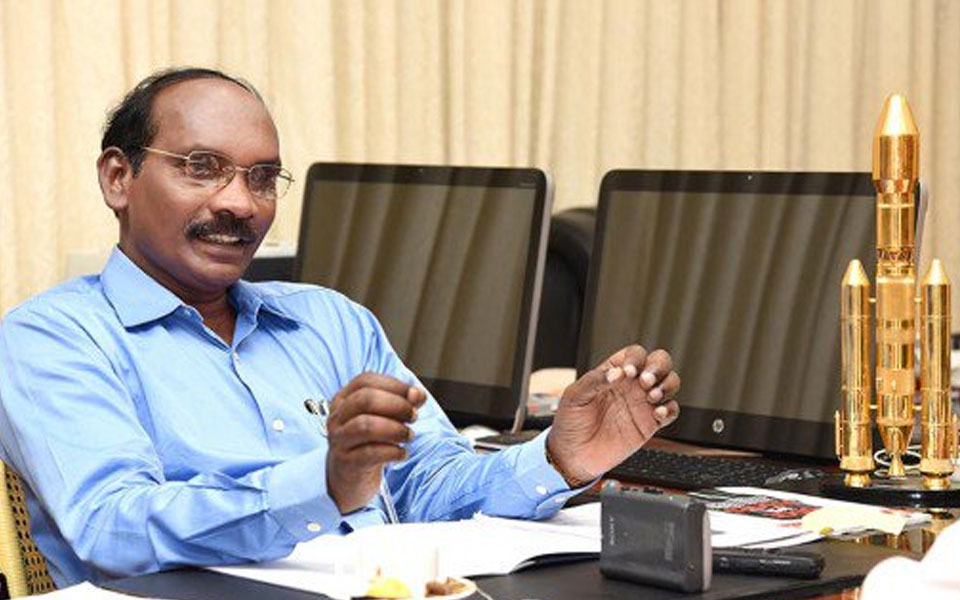Chennai, Sep 15 : The Indian space agency expects to fly its first small rocket with a carrying capacity of about 500-700 kg sometime next year, according to a top official.
"The developmental work for our small rocket that can carry satellites weighing around 500 kg is on. The first flight of the small rocket is expected to happen sometime next year," ISRO Chairman, K.Sivan told IANS.
He said the small rocket will be launched from the existing rocketport at Sriharikota in Andhra Pradesh.
In a recent interaction with IANS in Bengaluru, S.Rakesh, Chairman-cum- Managing Director, Antrix Corporation said the low-cost small rocket requires a dedicated launch pad with a simple vertical launch mechanism.
"Though SSLV will be initially launched from our rocketport at Sriharikota in Andhra Pradesh, we want to have a separate spaceport for it later," Rakesh had said.
Queried about Rakesh's views on the separate spaceport Sivan said initially the small rocket will be flown from Sriharikota. Antrix may have its own plans for the future.
Incidentally, Antrix is calling Indian nationals to apply for the post of `Head, Manufacturing & Marketing of Space Systems'. The job description being: "Preplanning activities of new Space Transport Systems which Antrix is envisaging to put into production. Establishment of production facilities in co-ordination with ISRO and Industries for Technology Transfer and production of the System."
Sivan also said the Indian Space Research Organisation (ISRO) is evaluating the various proposals it has received for its lithium-ion battery technology and is expected to complete the process in a month's time.
"In a month or so the first level of screen of the proposals will be over," Sivan said.
Over 130 companies had shown interest in the Indian space agency's lithium-ion cell technology.
In June this year, ISRO had announced its decision to transfer this technology to the Indian industry on a non-exclusive basis for usage in automobiles for Rs 1 crore.
The Vikram Sarabhai Space Centre located in Kerala, will transfer the technology to the successful Indian industries or start-ups on a non-exclusive basis to establish production facilities in the country that can produce cells of varying sizes, capacities, energy densities and power densities catering to the entire spectrum of power storage requirements, ISRO had said.
At present, the lithium ion battery is the most dominant battery system finding applications for a variety of societal needs including mobile phones, laptops, cameras and many other portable consumer gadgets apart from industrial applications and aerospace.
Recent advances in the battery technology have made it the preferred power source for electric and hybrid electric vehicles also.
Let the Truth be known. If you read VB and like VB, please be a VB Supporter and Help us deliver the Truth to one and all.
Kalaburagi: Four men have been arrested in Kalaburagi on charge of hacking a man with lethal weapons and pelting stones at him under the limits of Station Bazaar Police Station recently.
According to police sources, Anand Jalak Shinde (34), Ashitosh Jalak Shinde (30), Imran Mehboob Sheikh (28) and Sohaib Anwar Qureshi have been arrested. The men are accused of the brutal murder of Syed Mehboob, a resident of Station Bazaar Upper Line Hamalawadi in the city.
An FIR was filed by the Station Bazaar Police Station based on a complaint given by Syed Ismail, father of the deceased Syed Mehboob.
Following quick probe, the police team successfully arrested the suspects within 24 hours. The arrested men were produced in court and have been sent to judicial custody.
The City Police Commissionerate has appreciated in an official release the police team’s quick solving of the murder case and arrest of the four men accused of murdering Syed Mehboob.





